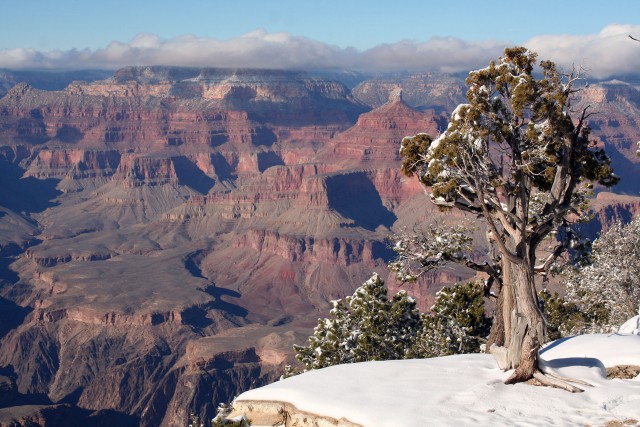
WASHINGTON — Interior Secretary Ken Salazar has
announced a final decision to impose a 20-year ban on new mining claims
on 1 million acres surrounding the Grand Canyon, an area where uranium
mining stakes have spiked 2,000 percent in the last seven years.
The ban “is the right approach for this priceless
American landscape,” Salazar said Monday. “We have been entrusted to
care for and protect our precious environmental and cultural resources,
and we have chosen a responsible path that makes sense for this and
future generations.”
Environmentalists and some lawmakers praised the
decision, saying it would protect the critical Colorado River watershed
from possible contamination from uranium mining and would prevent the
Grand Canyon panorama from being gradually industrialized. The Obama
administration first indicated last June its intention to sequester the
acreage from mining. Mines currently in operation would not be affected.
“People that hunt, fish and drink the water here are
concerned about the risks of mining here,” said Arizona Wildlife
Federation board member Ben Alteneder. “Uranium has a toxic legacy. Why
wouldn’t we want Secretary Salazar take precautions to protect our
families and local wildlife?”
The mining industry and its congressional supporters
warned that removing such a vast swath of land from industry risked jobs
and economic growth.
“Safe and responsible mining of this land could have
produced thousands of high-paying, family-wage mining jobs,” said Rep.
Doc Hastings, R-Wash., chairman of the House Natural Resources
Committee, in a statement. “The United States is already 90 percent
dependent on foreign sources of uranium and this decision only
exacerbates our foreign dependence by locking up our own clean energy
resources.”
The moratorium builds on a 2 1/2-year hiatus on
mining claims Salazar imposed in 2008 in response to the rise of mining
claims along the edge of the Grand Canyon National Park.
Mining claims around the Grand Canyon are among the
thousands filed by companies along the borders of numerous national
parks and wilderness areas. In the past seven years, mining companies,
many of them foreign firms, have filed claims to the rights to copper,
gold, uranium and other metals on federal land around Mount Rushmore,
Joshua Tree National Park and other famous refuges at an increased rate
because of rising global prices, according to a 2011 report by the Pew
Environment Group.
Critics say an outmoded 1872 law is driving the
increase in claims in such sensitive places. The law allows corporations
to stake out rights to federal lands for mining without a competitive
bid and to extract resources without paying royalties.
___
©2012 Tribune Co.
Visit Tribune Co. at www.latimes.com
Distributed by MCT Information Services














